Life Sciences News
See our Latest Journal Publications
Professor Laura Green moving to University of Birmingham
Congratulations to Deputy Pro-Vice-Chancellor (interdisciplinary research and impact) and former Head of the School of Life Sciences, Professor Laura Green, who has been appointed to the role of Pro-Vice-Chancellor for Life and Environmental Sciences at the University of Birmingham. She will take up her new role on 1 October 2018.
Delivering STEM experience to young people
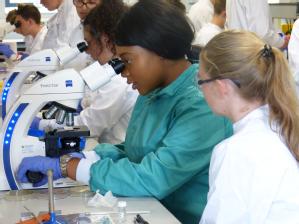 This week the School of Life Sciences is welcoming students from across the UK as part of the 2018 Headstart Programme.
This week the School of Life Sciences is welcoming students from across the UK as part of the 2018 Headstart Programme.
Taking place at the Gibbet Hill campus 15-19 July, the Headstart course provides a university taster course for 16-17 year olds with the opportunity to explore the different biological disciplines taught within the School of Life Sciences. The Life Sciences course enables students to gain experience at a prestigious university prior to making UCAS applications, showing them the different courses and career paths available.
Across the week, students will take part in a wide range of hands-on laboratory experiments and lectures including physiology, microbiology, cell biology and molecular biology.
Organised by the EDT (Engineering Development Trust), Headstart has been established for more than 18 years as a charitable trust providing hands-on Science, Technology, Engineering and Maths (STEM) activities and taster courses to encourage young people into technology-based careers.
Life Sciences Graduation and Awards 2018
On Tuesday 17 July graduands from the School of Life Sciences attended the Summer Graduation Ceremony held in Butterworth Hall, Warwick Arts Centre. The Head of School, Professor Lorenzo Frigerio, academic tutors and other staff also attended the ceremony.
Warwick ranked 4th in Europe in new Times Higher Education (THE) Europe Teaching Rankings 2018
THE (the Times Higher Education) have announced in their Thursday 12 July 2018 edition, that the University of Warwick has been ranked 4th in Europe in their new Times Higher Education (THE) Europe Teaching Rankings 2018 and is the 3rd placed University in Europe offering Biological Sciences.
Enzyme discovery could help in fight against TB
An enzyme structure discovery made by scientists at the University of Warwick could help to eradicate tuberculosis (TB).
Research by a team led by Dr Elizabeth Fullam, has revealed new findings about an enzyme found in Mycobacterium tuberculosis (Mtb) the bacterium that causes TB. TB causes more deaths than any other infectious disease, including from HIV and malaria.
5th Midlands Molecular Microbiology Meeting (M4)
The 5th M4 meeting will be held at the University of Warwick on 13-14 September, 2018.
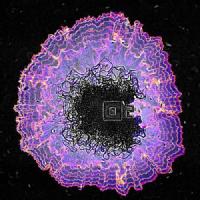 The Conference will present cutting-edge research on molecular and cellular microbiology. A wide range of topics will be covered, ranging from biofilms, quorum sensing, pathogenicity islands, host-pathogen interactions and antimicrobials.
The Conference will present cutting-edge research on molecular and cellular microbiology. A wide range of topics will be covered, ranging from biofilms, quorum sensing, pathogenicity islands, host-pathogen interactions and antimicrobials.
The goal of this conference is to act as a conduit for fostering collaboration across Midlands and nationally among leading scientists and to promote the exchange of ideas between the next generation of molecular microbiologists. The conference will offer early career researchers an opportunity to present their research and connect with other scientists.
Two million pounds awarded to fight disease in East Africa
The University of Warwick has been awarded £2 million to tackle the spread of viruses in East Africa.
The award has been made to the NIHR Global Health Research Group on the Application of Genomics and Modelling to the Control of Virus Pathogens (GeMVi) in East Africa at the University of Warwick. GeMVi brings together expertise in pathogen sequencing and predicative modelling. Life Sciences academics Professor James Nokes and Professor Matt Keeling are co-investigators.
Dr Dan Smith named as honorary SLS Industry Professor
Dr Smith is currently Chief Scientific Officer at Cobra Biologics Ltd., but he started his scientific career here at Warwick, with a BSc in Biochemistry then a PhD on the mechanism of action at the cellular level of cytotoxic proteins such as ricin.
By becoming an honorary Industrial Professor in our School, Dr. Smith will bring widespread experience in both the workings of a multi-million budget R&D company in a sector at the forefront of biomedical products and also in academic research. His specific expertise in knowledge transfer and experience in developing successful collaborations between regional development agencies, industry and academics will be enormously useful.
Dr Smith will bring many links with industries that we do not yet interact with, both in the UK and internationally. He will contribute ideas and contacts to help our undergraduate students secure industrial placements, a key strategic development area for the School.
Dr Smith will also aid our technology transfer to support start-ups with commercial promise. His past work is highly interdisciplinary in both the academic and industrial sides in chemistry and biology, knowledge of which can massively impact startup success.
We welcome him to the School.
£1.2 million boost to crop research at University of Warwick
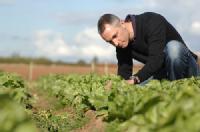 New funding to develop scientific breakthroughs in crop research and innovation
New funding to develop scientific breakthroughs in crop research and innovation
The University of Warwick is set to receive £1.2 million in funding to support its pioneering research in improving the resilience, sustainability and productivity of UK crops, Environment Secretary Michael Gove has announced today.
Kenilworth Show 9 June
Members of the School of Life Sciences and Warwick Crop Centre are looking forward to being part of the Kenilworth Show on Saturday 9 June. We'll be demonstrating some of our research and teaching activities related to food production and hoping for visitor participation! Come and see us in the Educational Area.
Memory processes depend on protein ‘off-switch’ – could lead to new Alzheimer’s treatments
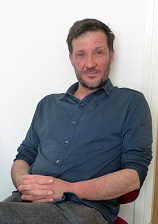 Memory, learning and cognitive flexibility depend on a protein ‘off-switch’ in the brain, according to a breakthrough discovery made by an international research collaboration co-led by Dr Mark Wall at the University of Warwick.
Memory, learning and cognitive flexibility depend on a protein ‘off-switch’ in the brain, according to a breakthrough discovery made by an international research collaboration co-led by Dr Mark Wall at the University of Warwick.
This new knowledge could enable us to better understand and combat neurological diseases which inhibit memory, such as Alzheimer’s.
Work Life Balance, Mental Health and Well-Being - 5 July 2018
 On Thursday 5 July 2018 the School of Life Sciences will be holding a national Athena SWAN event on the topics of Work Life Balance, Mental Health and Well-Being. The event is free and open to all. Please register to attend.
On Thursday 5 July 2018 the School of Life Sciences will be holding a national Athena SWAN event on the topics of Work Life Balance, Mental Health and Well-Being. The event is free and open to all. Please register to attend.
Event flyer (pdf)
University of Warwick ranked 4th in UK for Bioscience
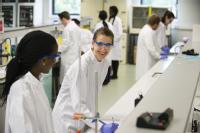 The Guardian University league table has ranked Warwick 8th in the UK for 2019, maintaining our position from 2018 and ranking the University top in the West Midlands. The new table is published today, Tuesday 29 May, 2018.
The Guardian University league table has ranked Warwick 8th in the UK for 2019, maintaining our position from 2018 and ranking the University top in the West Midlands. The new table is published today, Tuesday 29 May, 2018.
The Guardian University Guide also ranked Biosciences (School of Life Sciences) 4th.
These results provide recognition of Warwick's excellence in teaching and research.
New academic appointments in the School of Life Sciences
The School of Life Sciences invites applications for four new academic positions to strengthen key research areas in the School. This is part of our strategic growth on the Gibbet Hill Biology campus, supported by investment in a new Interdisciplinary Biomedical Research Building that will bring together researchers from Life Sciences and Warwick Medical School to understand the origins and mechanistic basis of diseases.
Life Sciences gets share of £2.6 million research funding from Diabetes UK
 Diabetes UK has committed to invest £2.6 million in 19 brand new projects which aim to make life-changing improvements in diabetes care, and reduce people’s risk of Type 2 diabetes.
Diabetes UK has committed to invest £2.6 million in 19 brand new projects which aim to make life-changing improvements in diabetes care, and reduce people’s risk of Type 2 diabetes.
The funding will be given to projects looking into Type 1, Type 2 and gestational diabetes.
In one of these projects, Dr Freya Harrison, from the School of Life Sciences, will be using medieval remedies to find new sources of antibiotics. She has already discovered a combination that can kill antibiotic-resistant bacteria in the lab.
HE Bioscience Technician of the Year Award
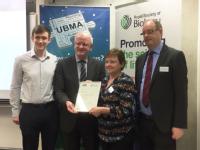 On Thursday 19 April Gill Scott, School of Life Sciences Teaching Laboratory Manager, was awarded the Higher Education Bioscience Technician of the Year Award at the University Bioscience Managers’ Association (UBMA) Annual Conference at Imperial College London. The competitive award, presented by Professor James Stirling, recognises the superb work of technical staff which underpins the bioscience research and teaching at all levels in universities across the UK. The judges were incredibly impressed with the quality and breadth of Gill’s technical work. She received a £400 prize and a free year of Royal Society of Biology membership.
On Thursday 19 April Gill Scott, School of Life Sciences Teaching Laboratory Manager, was awarded the Higher Education Bioscience Technician of the Year Award at the University Bioscience Managers’ Association (UBMA) Annual Conference at Imperial College London. The competitive award, presented by Professor James Stirling, recognises the superb work of technical staff which underpins the bioscience research and teaching at all levels in universities across the UK. The judges were incredibly impressed with the quality and breadth of Gill’s technical work. She received a £400 prize and a free year of Royal Society of Biology membership.
Gill first came to SLS in 1978 and over the years has made a tremendous contribution to the School’s lab-based teaching and outreach activities. In 2018 Gill was instrumental in SLS delivering the International Biology Olympiad practical exams.
Gill retires at the end of April and we wish her all the best for the future.
(Photo courtesy of UBMA)
Warwick-backed state-of-the-art cryo-electron microscopy facility opened
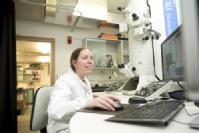 A new state-of-the-art Cryo-Electron Microscope (Cryo-EM) facility that will advance the understanding of the processes of life has been officially opened.
A new state-of-the-art Cryo-Electron Microscope (Cryo-EM) facility that will advance the understanding of the processes of life has been officially opened.
The Midlands Regional Cryo-EM Facility is the result of a collaboration between the University of Warwick, Nottingham, Birmingham and Leicester, led by the University of Leicester. The universities are members of the Midlands Innovation partnership. The total investment exceeds £6M with £3.7M from the Medical Research Council (MRC). The four partner Universities provided the remaining funds.
Pint of Science Coventry brings scientists out of the lab and into your local pub 14-16 May
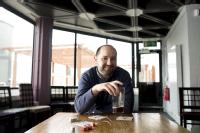 The public science festival, Pint of Science, is coming to Coventry for the first time this year, with experts from the Universities of Warwick and Coventry talking about their research work in a selection of pubs and venues around the city.
The public science festival, Pint of Science, is coming to Coventry for the first time this year, with experts from the Universities of Warwick and Coventry talking about their research work in a selection of pubs and venues around the city.
There are a number of talks from researchers in the School of Life Sciences:
14 May - Life is the name of the game
Professor Chris Dowson on 'Antibiotic Resistance: No drugs, bad bugs'
15 May - Drink, Drugs and Sunscreen
Professor Kevin Moffat on 'The life of fly - alcohol, sex and violoence!'
16 May - The future of health
Dr Andrew Nelson on 'Invasion of trophoblasts: maintaining prenancy'
Dr Corinne Hanlon on 'Synthetic Biology - who draws the line'
Professor R.John Ellis to be presented with 2019 Centenary Award
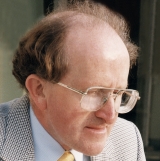 Professor R.John Ellis, an Emeritus in the School of Life Sciences, has been honoured in the Biochemical Society's annual Awards. The awards recognise scientists for the excellence of their work and the impact it has had within the bioscience community and wider society.
Professor R.John Ellis, an Emeritus in the School of Life Sciences, has been honoured in the Biochemical Society's annual Awards. The awards recognise scientists for the excellence of their work and the impact it has had within the bioscience community and wider society.
Professor Ellis will be presented with the 2019 Centenary Award for his pioneering research on molecular chaperones and their role in protein folding.
Professor Laura Green appointed to BBSRC Council
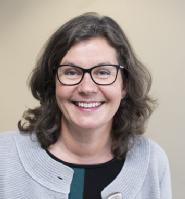 Professor Laura Green OBE, Deputy Pro Vice Chancellor (Research) at the University of Warwick, has been appointed to the Council of the Biotechnology and Biological Sciences Research Council (BBSRC).
Professor Laura Green OBE, Deputy Pro Vice Chancellor (Research) at the University of Warwick, has been appointed to the Council of the Biotechnology and Biological Sciences Research Council (BBSRC).
